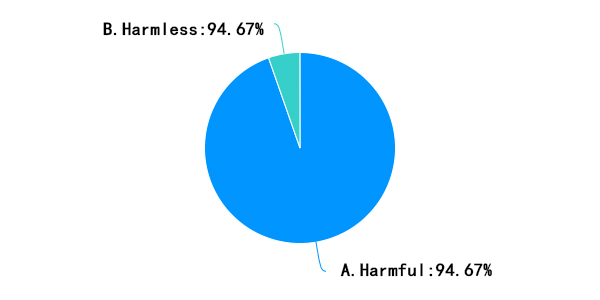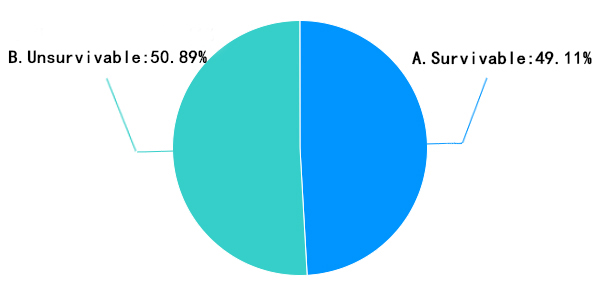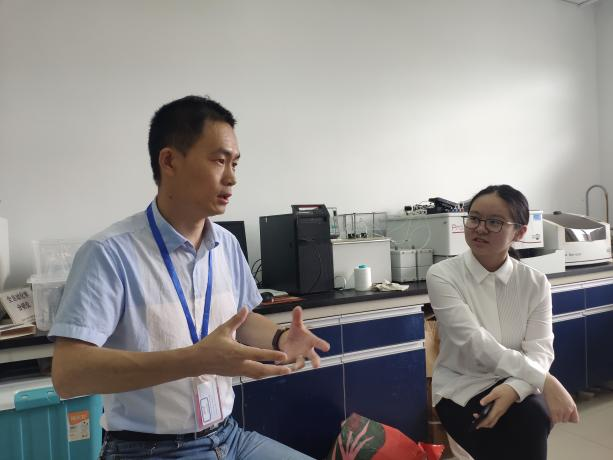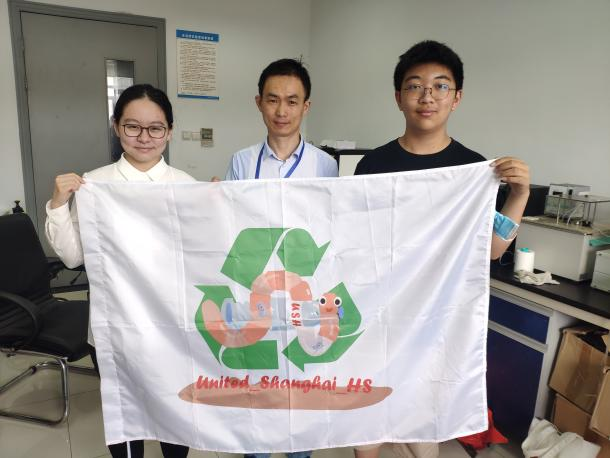

Summary of HP Questionnaire Investigation
About the plastic
It can be seen from Figure 1 and figure 2 that the public has a general understanding of plastic waste and believes that the existence of plastic in the environment is an environmental problem. While most people agree that plastic pollution needs to be addressed as soon as possible, there is little opposition to existing methods of disposing of plastic waste, including landfills, incineration, recycling, etc. Microplastics are thought to be harmful in the long run.

Figure 1: Public opinion on existing plastic waste disposal methods

Figure 2: Public opinion on whether microplastics are harmful to human health
1.The earthworm
According to figure 3, we can conclude that "the role of earthworms is to decompose various organic substances, improve soil quality, and increase the content of nutrients in the soil." The public had a clear understanding of earthworms and generally held a positive attitude. However, there are many doubts about the viability of earthworms in soils with high plastic content, which need to be verified by subsequent experiments.

Figure 3: Predictions of earthworms’ capability of surviving in soils with high plastic content
At the same time, in the investigation, we also learned that there is some doubt about the reliability of earthworms carrying the engineered bacteria.

Figure 4: Public attitudes towards using earthworms to carry engineered bacteria
2.About Engineered bacteria
However, there are concerns about the use of synthetic biology for environmental governance. The main concern is the safety of engineered bacteria and their effects on the soil environment (including earthworms, plants, and other microorganisms).

Figure 5: Public attitudes towards the use of synthetic biology to address environmental issues
Most people are not aware of the use of biological technologies to degrade plastic in the environment, but support the use of earthworms to carry engineered bacteria to decompose plastic in the environment.

Figure 6: Public understanding of the use of biotechnology to treat plastic products

Figure 7: People's attitudes towards the project
Summary of interviews No.1
On July 6, two members of our team, Zhu Yanhong and Zhang Zhihao, came to the School of Ecology and Environmental Science of East China Normal University. Specially visited the eco-environmental governance expert: Professor He Defu. After introducing our "PET Big Stomach King" project, Professor He gave the following suggestions for our project.
BRIEF DESCRIPTION OF EXPECT;
He Defu, Male, Doctor, Associate Professor. Since 2003, he has been working in the Department of Physiology and Toxicology, Department of Environmental Science, East China Normal University. He is mainly engaged in environmental toxicology, environmental chemical pollution and health research. The main research directions include: (1) Toxic effects of chemical environmental pollutants and their mechanism of action; (2) Hygienic toxicology related to Parkinson's disease; (3) Drug toxicology and safety evaluation; (4) Toxicity detection analysis and related technology research.
01.About Plastic
Professor He believes that the biodegradation of plastics is a scientific and technological problem. Current studies have shown that its degradation efficiency is generally very low, and the biological species of biodegradable plastics are effective. This is incomparable with the exponential growth of plastic production, and it is also an important reason for the increasing severity of plastic pollution. Moreover, the degradation of plastic polymers will also lead to the release of a large number of plastic additives, such as phthalates, flame retardants, and antioxidants, which are harmful to organisms and the environment. At present, biodegradable plastics are still under research, and progress is slow, because related research has not yet broken through, such as which biodegradable plastics, degradation efficiency and mechanisms, and types of degradable plastics are still under study. But this project is very meaningful and can be recommended by the government.


02.About Earthworms
Professor He believes that the project potential of earthworms carrying engineered bacteria to degrade plastics in the soil is very large. At present, there is no similar method or product in China's agricultural field. The experiment can start with the biodegradation of the mulch in the soil of the farm and the simulation experiment. Earthworm breeding has mature technology, which is generally simple, and it is enough to keep the soil temperature, humidity and food. There are indeed many laboratories undertaking research, but the progress is slow, the soil is rich in organic matter, and earthworms will not actively eat plastic is the key issue. But you can try to use the mobility of earthworms to expand the geographical scope of engineering bacteria to degrade plastics in the soil.


(By Yanhong Zhu on July 8,2021)
Summary of interviews No.2
On July 16, our HP team members Jiankun Liu and Shixuan Wang visited Dr. Zheng from the Shanghai Academy of Agricultural Sciences. After introducing the content of our project to him, we consulted some project-related issues.
BRIEF DESCRIPTION OF EXPECT;
Xianqing Zheng: In 1980, Ecology, associate researcher, worked at the Institute of Ecological Environment Protection, Shanghai Academy of Agricultural Sciences. Mainly engaged in the research of agricultural restoration ecology, including long-term basic monitoring of agricultural production area environment, problem soil bioremediation, agricultural waste ecological treatment and resource utilization, and soil animal ecological functions and mechanisms in planting and raising models.
01.About Plastic
With the continuous increase of human plastic production, waste plastics are broken down into smaller particles in the environment, which are called microplastics. Microplastics are ubiquitous in soil and water sources, and can enter animals through food. At present, microplastics have been found in human tissues. Since it has not yet shown serious harm in animals and humans, it has received far less attention than other pollutants such as heavy metals.
Dr. Zheng believes that even if plastics have not yet manifested obvious harm, we should still vigorously develop technologies to deal with plastic pollution in case of emergency.


02.About Earthworms
The type of earthworm we used this time is William ringworm. In terms of the living environment, the earthworm will need soil with moderate pH, not too high organic matter content, and a certain amount of salt. The temperature is controlled within the room temperature range. At present, it seems that because of its insignificant toxicity, earthworms will not take the initiative to avoid soil with high plastic content.
Dr. Zheng indicates that currently millimeter-sized plastic particles cannot be absorbed by the earthworm's digestive system, but smaller Nano-sized particles may be absorbed. The tolerance of earthworms to this is awaiting research.


03.About the Engineering bacteria
Because the bacteria naturally produced in the engineering bacterial environment used in this project are implanted with specific gene fragments, they will not affect the environment after being released into the environment. The ability of engineered bacteria to produce enzymes to decompose PET plastic and turn it into harmless substances may change the habits of earthworms in the long term.
Xianqing Zheng believes that what is currently more uncertain is the cultivability of bacteria in earthworms, and there is no major risk beyond that.


04.Market prospects
With regard to plastic waste, although the market has responded positively, the prospects are relatively small. The main reason is the lack of interest and the low willingness of enterprises to participate. Enough attention and funding are needed to fully promote the application. For long-term considerations, the results of this project are more likely to be an important technical reserve.
(By Jiankun Liu on July 25,2021)



Contact us:
woxihuan36@foxmail.com


